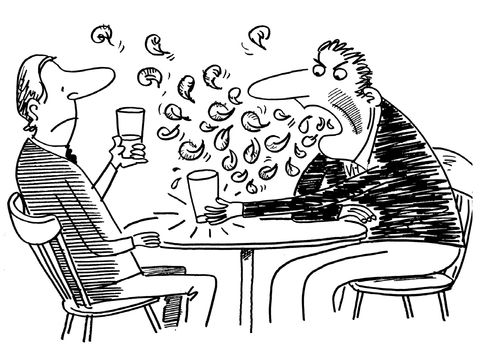Table of Contents
Also by Harry Oliver
BUBBLE GUM AND HULA HOOPS
BLACK CATS & FOUR-LEAF CLOVERS
For James, who certainly had a way with words.
This book is dedicated to the memory of
James Ravenscroft, my dear friend and
coauthor, who died tragically and suddenly
a week after the completion of this book.
His enlivening, endlessly funny company turned
what could have been painstaking hours of
research and writing into a wonderful roller-
coaster ride of laughter, arguments, and ideas.
Working together was sometimes a distraction,
and a tea break would often turn into an
afternoon of pretending to be penning the book
while really just having a chinwag. But we got
there. Without him none of this would have
happened, and I will never forget him for the
lovable, superb character that he was.
ACKNOWLEDGMENTS
There are so many to thank that the order in which I do so is somewhat arbitrary. But the first person has to be Sarah Marshall, Jamess fiance, who endured many an evening and weekend of James and me covering their home with paper and typing away. Where would we have been without those sturdy, nutritious veggie dinners and your patient encouragement?
Heartfelt thanks for the huge number of ideas and suggestions from friends and family. Particular thanks are due to Mandy Kirby for excellent research links, Gill Parting-ton and Eleanor Chiari for their sound academic advice, and Nicki Malliaros for fascinating entry suggestions.
I am very grateful to Mike Mosedale for his wonderful illustrations. Always a pleasure to work with, your patience and humility when asked to make changes to drafts (which of course meant redrawing entire pictures) was truly admirable! Your attention to detail and humor is much appreciated.
INTRODUCTION
In spite of the fact that we continually use hundreds of words and phrases to communicate with one another, we rarely take the time to consider why they mean what they do, or where they come from. After all, most of us have better things to doat least we should have! To do much more than briefly ponder the sense in turning over a new leaf when we vow to change our ways is simply not something most of us have time for. But think about it and you might start to wonder: what exactly is a new leaf, and why would anyone turn it over, and what does this have to do with starting again? There is nearly always an answer, but it is not always easy to find.
Indeed, if one were to attempt to get to the bottom of the origins of just a few choice expressions from our endlessly rich language, ones work would be cut out to the point that the most likely result would be nothing more than a stonking headachebut why stonking? The point is that we take our language for granted as a matter of necessity. I feel very lucky about this, for it means theres a whole cosmos of intrigue, history, and humor lying behind the words we bandy about that I am sure will captivate anyone who utters words in English today.
I set out to achieve three things when writing this book. To inform, to entertain, and to avoid making people yawn. Within its pages are a substantial number of widely used phrases, and a cluster of less well-known and quirky ones that will be welcome additions to anyones vocabularyit is hoped that all of them will provide memorable and diverting answers to the questions that may be posed about their origins. This is by no means a comprehensive guide to the history of English, but a fun volume that maintains historical accuracy when explaining some truly interesting parts of our everyday speech.
Often, when trying to find the origin of a choice word or phrase, it was hard not to come a cropper as a result of diverse opinions about its true background. But instead of throwing in the towel, I decided to either give the definition with the most credible and popular explanation, or where it was too close to call, I have simply given the possibilities and left the reader to ponder the somewhat imponderable.
Thank you for dipping into your wallets to buy this bookalthough I do hope you didnt acquire it on the black market. Either way I would be most pleased if you enjoy its pages enough to conclude that it would be cheap at half the price. Happy reading!
FOOD AND DRINK
Spitting Feathers
Butter wouldnt melt in his mouth
This phrase has been in use since at least the fifteenth century, but its origins are pretty much unknown. We use it when speaking of a person whose exterior meekness and gentility belies the true awfulness of their nature, which is the opposite of innocent! What is interesting about the phrase is that, when examined, we might have some trouble making sense of the metaphor. After all, if taken literally it is quite absurdwhether they are good or bad, butter will always melt in someones mouth. Perhaps the phrase, which is at least 500 years old, developed out of a sense of someone being so cool, calm, and collected that, figuratively speaking, even one of the most easily melted substances would remain unchanged when brought into contact with them. Such a person would surely be a pretty sinister fellow, capable of still more sinister acts of deception!
Caesar salad
The salad is named after Caesar Gardini, the owner-chef at a restaurant called Caesars Place in Tijuana, Mexico. The Italian chef invented the dish in 1924 over the July 4th weekend. Legend has it that the kitchen had pretty much run out of food and he constructed the salad from what was left: romaine lettuce, garlic, olive oil, croutons, eggs, and Parmesan cheese.
Cheesy
The moment when we hear or see something that is truly cheesy is not a pleasant one. It might be a lyric on the radio that is so gooey and silly it makes us physically ill; or a plotline in a film that is so contrived and contains such unrestricted sentimentality you can do nothing but feel grimly cynical. The word cheesy describes the similarly stifling effect of overripe cheese on its victim.
Cold shoulder
To give someone the cold shoulder is to ignore them and/or make them feel uncomfortable. Tradition has it that, when a guest of a large household had outstayed their welcome, the host would serve them a meal of cold meat, usually a shoulder of mutton, to indicate that it was time they left. This is an unlikely explanation, not least because cold meat is often tasty, so if the guest was a gluttonand if they had overstayed their welcome, why wouldnt they be?they might not get the message. The earliest reference to this phrase seems to be from the novel The Antiquary by Sir Walter Scott, which was published in 1816: The Countesss dislike didna gang farther at first than just showing othe cauld shouther. The phrase is born solely from the writers inventive use of language in describing an elaborate variation of the age-old snub of turning ones back on someone.
Cookie
Comes from the Latin panis biscoctus meaning bread baked twice, via the Old French











